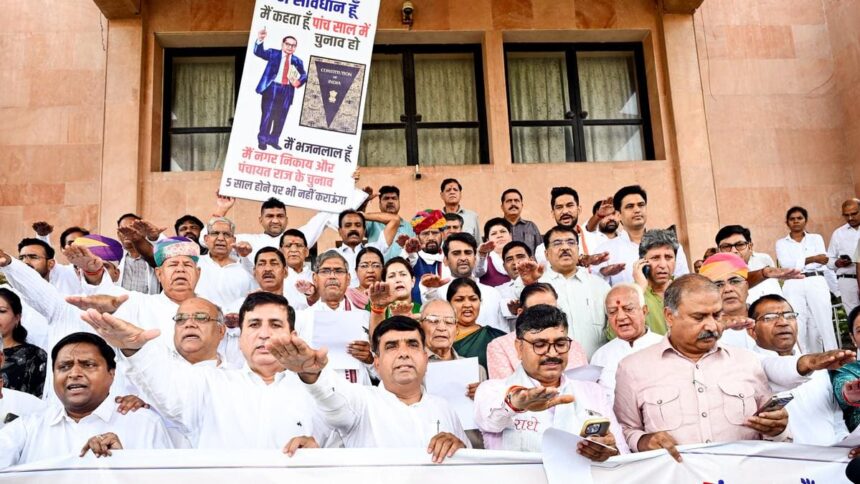Several civil society organizations, religious groups, and political parties issued a joint statement on Thursday opposing the anti-conversion law recently passed by the Rajasthan Assembly. They described the law as “draconian,” labeling it a tool to propagate “majoritarian hatred” and a measure that instills “fear among minority communities” in the state.
The statement asserted that the Rajasthan Bill is primarily a mechanism for the Bharatiya Janata Party (BJP) to promote the Sangh ideology of majoritarian dominance over minorities, creating an atmosphere of anxiety among these communities. Organizations involved in the statement include the People’s Union for Civil Liberties, the Association for Protection of Civil Rights, and the Rajasthan Buddhist Mahasangh, among others. They warned that the Bill will establish a two-class system within governance.
The Rajasthan Religious Conversion Bill, 2025, is described as “much wider, more stringent, and more invasive” compared to similar laws in 11 other Indian states, including the recently amended Uttar Pradesh law from 2024. Critics argue that the legislation fails to meet constitutional standards, particularly concerning definitions, procedures for conversion, and the proportionality of penalties.
Since the Bill was introduced in the state Assembly on September 3 and passed on September 9, over nine attacks against the Christian community have reportedly occurred, highlighting concerns regarding the law’s implications for law and order in the state.
In response, the organizations plan to meet with the governor to advocate against signing the “unconstitutional Bill” and to urge him to refer it to the President under Article 200. They referred to previous successful efforts in 2006 and 2008, where governors were persuaded to send similar legislation to the President rather than approve it.
The groups intend to mobilize communities, including minorities, through public debates aimed at exposing the Bill’s legal inadequacies and constitutional infringements. Their planned activities include rallies, public meetings, social media initiatives, and signature campaigns, along with postcard drives. They also plan to challenge the law in the Supreme Court once it takes effect, joining other petitions against similar state laws.
Critics emphasize that the Bill includes severe mandatory sentences, with its offenses classified as cognizable and non-bailable, thus rendering it legally troubling. Recent attacks on Christians include incidents in Alwar, Hanumangarh, Dungarpur, and Jaipur, all coinciding with the Bill’s introduction.
The organizations indicated that the passage of the Bill grants right-wing groups affiliated with the Rashtriya Swayamsevak Sangh (RSS) a “license to target minorities.” They also expressed concerns about privacy violations embedded in the mandatory reporting and conversion processes, warning that any citizen can report a potential violation, thereby enabling misuse and infringing individual religious freedoms.
Furthermore, the law exempts activities associated with Hindu reconversions under Section 3(4), which states that reverting to one’s “original” or “ancestral” religion does not qualify as a conversion. This provision positions Hinduism as the default faith, implying supremacy over other religions, which violates Articles 14, 19, 21, and 25 of the Indian Constitution.
The organizations assert that the law could criminalize religious practices and restrict freedoms outlined in Article 25, further subordinating minority communities. They criticized the punishments as excessive and believe the legislation will not withstand judicial review.
The Rajasthan Prohibition of Unlawful Conversion of Religion Bill, 2025—also known as the Anti-Conversion Bill or Freedom of Religion Bill—was tabled in February 2025 and later passed on September 9, making Rajasthan the twelfth Indian state to enact such a law. This marks the third attempt by the Rajasthan government to implement similar legislation. Past iterations in 2006 and 2008 were passed by the assembly but returned by the President without approval due to opposition from Congress and human rights advocates.
The new Bill imposes significantly harsher penalties for unlawful conversions compared to earlier proposals. Offenders may face imprisonment ranging from seven years to life and harsh fines, with stricter penalties for cases involving women, minors, Scheduled Castes/Scheduled Tribes, disabled individuals, or mass conversions. Repeat offenders face a minimum of 20 years in prison and fines up to ₹50 lakh. Cases involving forced conversions carry life sentences and fines starting at ₹30 lakh, with repeat offenses facing penalties as high as ₹50 lakh.
Properties utilized for illegal conversions may be subject to demolition or confiscation, and institutions involved risk losing their operating licenses and facing fines up to ₹1 crore. All offenses under the Bill are classified as cognizable and non-bailable.
The enactment of this Bill has ignited widespread controversy, leading to a walkout by the Congress party in the assembly, public demonstrations by minority groups, and critical reactions from opposition parties and civil society organizations. Detractors argue that the law reflects the BJP and RSS’s agenda against “proselytization,” asserting it serves more to placate Hindu majoritarian sentiments than to address actual instances of coerced conversion while empowering vigilante groups. The preferential treatment for reconversions to “ancestral” religion is seen as discriminatory, fostering a dual legal system where Hindu reconversions remain unregulated while others face scrutiny.
Tags: Draconian, anti-conversion law, Rajasthan, civil society, religious groups
Hashtags: #Draconian #Civil #society #religious #groups #parties #condemn #Rajasthan #anticonversion #law










